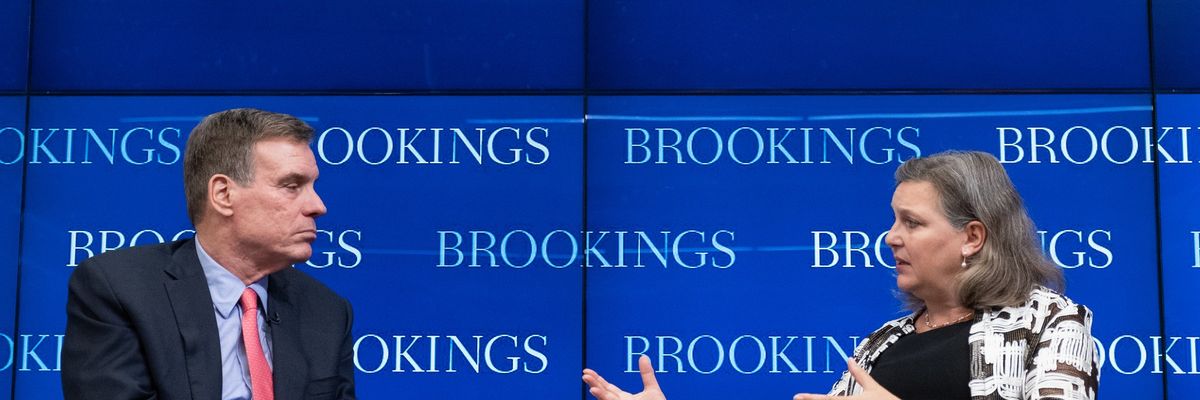Speaking in 1966 at the Brookings Institution’s fiftieth anniversary, President Lyndon Baines Johnson heralded the role of virtue, ethics and fact-driven research in pursuit of improved public policy. “The methods which have worked so well in advancing man's knowledge of himself and his universe are exactly the methods which can show us the way toward better public policies — a distrust of simple answers to very complex problems, and always healthy respect for the facts, a conscientious effort to submerge bias and prejudice, and a refusal to stretch the conclusions beyond the evidence,” said Johnson.
Johnson was highlighting the powerful role that think tanks, such as Brookings, play in shaping public policy. They connect academia and policymakers, conduct original research and translate obscure policy initiatives into more accessible op-eds, media talking points, written reports and testimony before Congress.
But fifty-five years later, confidence in our policymaking institutions and think tanks are reaching record lows. A Pew Research Center poll recently found that only 20-percent of Americans “say they trust the federal government to do what is right just about always/most of the time.” And that lack of trust trickles down to think tanks as well. While less research on think tanks has been conducted, a 2018 poll found that only 20-percent of Americans trust what think tanks have to say.
Indeed, the flood of dark money — opaque funds intended to influence political outcomes — opened up after the 2010 Citizens United Supreme Court decision has eroded public trust in government and the policymaking process. Think tanks have added to the public’s distrust by not disclosing donors and allowing donors to shape the content of their work.
Examples of funding driving think tank’s work are, unfortunately, far too numerous. The United Arab Emirates paid the Center for a New American Security (CNAS) $250,000 for a report that recommends exporting military grade drones to the UAE and other countries, but made no mention of the UAE funding. The conservative Heritage Foundation received $5.8 million from a South Korean weapons manufacturer, then aggressively advocated for the company’s landmines, munitions, and military robots. The left-leaning Center for American Progress (CAP) watered down its public response to the brutal murder of Jamal Khashoggi, at the behest of a staffer with close ties to the UAE, a large donor to CAP.
Moreover, while some think tanks disclose detailed information about their biggest donors, all-too-many think tanks still choose not to disclose any information about their funders or only partially disclose, listing some top-level donors as “anonymous.”
Think tanks, as Johnson highlighted, can play a crucial role in our democratic process, but when they fail to disclose their funders and engage in pay-to-play research they further erode the public’s confidence in the policymaking process. As we have documented in a recent report, to restore that trust, think tanks must take tangible steps to embrace funding transparency, compliance with the Foreign Agent Registration Act (FARA) and conflict of interest disclosure and avoidance.
First and foremost, think tanks must be fully transparent about their funding. This simple standard can preempt criticism of undisclosed funding arrangements influencing research products.
Second, think tanks should make an increased effort to comply with FARA, a statute requiring disclosure of various political activities undertaken at the direction of a foreign principal. Think tanks are increasingly turning to foreign governments for funding – more than $174 million went from foreign governments to the top U.S. think tanks between 2014 and 2018, led by Norway, United Kingdom and the United Arab Emirates – but very few have registered their activities under FARA.
The Justice Department, for its part, has taken a heightened interest in FARA violations with high profile prosecutions of Michael Flynn and Paul Manafort, but improved guidance from the Department as to what activities require registration would be a crucial step in bringing think tanks, and much of Washington, into greater compliance with the statute.
Finally, think tanks should openly acknowledge that conflicts of interest between funding and research can occur and implement best practices to identify and disclose these instances. Scientific journals, The New York Times, and National Public Radio all lay out comprehensive conflict of interest avoidance policies and disclosure requirements. Think tanks must embrace similar policies toward conflict-of-interest avoidance and disclosure.
Taken together, these measures will help think tanks rise above the all too common, but well justified, cynicism about special interests, dark money, and foreign governments influencing our elected officials and policymaking institutions.
In a political climate defined by fake news, misinformation and special interest money, the think tanks that Johnson envisioned more than 50 years ago, with a “healthy respect for the facts, a conscientious effort to submerge bias and prejudice,” are needed more than ever.
















